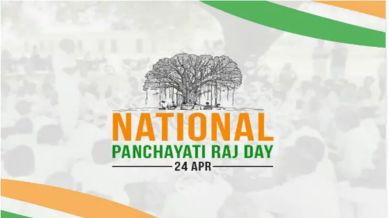National Panchayati Raj Day 2024: Get to know the date, origin, and significance
National Panchayati Raj Day 2024 (April 24): The idea of Panchayati rule was advocated vigorously by Mahatma Gandhi, who believed residents should be able to decide the best course of action for the development of their village on their own.

National Panchayati Raj Day on 24th April: Every year in April, India celebrates National Panchayati Raj Day to honour the establishment of the Panchayati Raj System, a devolved form of governance in the country, which was introduced in 1993 by the 73rd Constitutional Amendment Act, empowering local bodies, or Gramme Panchayats, to govern themselves and make decisions regarding the development of their respective areas.
The Panchayati Raj System is a significant step towards grassroots democracy and the empowerment of people in rural areas. By giving local bodies the power to govern themselves, the system promotes participatory democracy, where people can actively participate in decision-making processes that affect their communities.
The celebration of National Panchayati Raj Day highlights the importance of decentralised governance in promoting inclusive and sustainable development. By celebrating this day, India reaffirms its commitment to promoting grassroots democracy and empowering people in rural areas. Here is all you need to know, from date to origins, significance, and more.
National Panchayati Raj Day 2024: Date and Theme
The National Panchayati Raj Day is celebrated annually on April 24th, marking its 31st anniversary this year. The day was established in 1993 after the enactment of the 73rd Amendment Act, which introduced a three-tier system at the village, block, and district levels.
In 2024, there won’t be a particular theme for the National Panchayati Raj Day in India, as the Ministry of Panchayati Raj will host a national colloquium on ‘Governance at the Grassroots after Three Decades of the 73rd Constitutional Amendment’ at Vigyan Bhawan in New Delhi to mark the celebration of the day.
https://twitter.com/narendramodi/status/1782970987731972319 https://platform.twitter.com/widgets.js
National Panchayati Raj Day 2024: History and Significance
The Panchayati Raj System has its roots in ancient India, where the village council, known as the Panchayat, was the primary governing body. It wasn’t until 1993 that the Panchayati Raj System was granted constitutional status and made compulsory for all states in India. The 73rd Amendment Act of 1992, which came into effect on April 24, 1993, gave constitutional status to Panchayati Raj Institutions (PRIs), marking a significant moment in the history of decentralisation of political power to the grassroots level. This delegation of authority was a response to the demand for democracy. A panel headed by Balwantrai Mehta was established in 1957 to achieve this aim, and Panchayati Raj was established for the first time in decades.
In recent times, the importance of Panchayati Raj has grown, as effective local administration is necessary for India to achieve inclusive growth and address problems like climate change and rural-urban migration. PRIs are in a good position to ensure fair and sustainable development at the local level and respond to local demands.
In essence, National Panchayati Raj Day is an opportunity to recognise the contributions of Panchayati Raj institutions in promoting local governance and development and a time to reflect on the challenges faced by PRIs and the need to strengthen them further. It serves as a reminder that empowering local communities is essential for building a robust democracy.